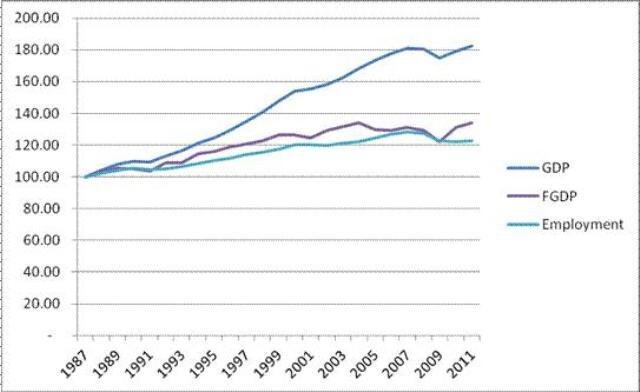The Long View 2008-01-10: Education for Failure & Fraud; Fort the Postmodernist; V-Objects; Yes We Can (Again); Taxes v. Contributions

John J. Reilly quotes Stefan Theil’s “Europe’s Philosophy of Failure”, but didn’t comment [in 2008] on this very neo-liberal declaration that catches my eye [in 2020]:
In France and Germany, students are being forced to undergo a dangerous indoctrination. Taught that economic principles such as capitalism, free markets, and entrepreneurship are savage, unhealthy, and immoral, these children are raised on a diet of prejudice and bias. Rooting it out may determine whether Europe’s economies prosper or continue to be left behind. “Economic growth imposes a hectic form of life, producing overwork, stress, nervous depression, cardiovascular disease and, according to some, even the development of cancer,” asserts the three-volume Histoire du XXe siècle, a set of texts memorized by countless French high school students as they prepare for entrance exams to Sciences Po and other prestigious French universities. The past 20 years have “doubled wealth, doubled unemployment, poverty, and exclusion, whose ill effects constitute the background for a profound social malaise,” the text continues. Because the 21st century begins with “an awareness of the limits to growth and the risks posed to humanity [by economic growth],” any future prosperity “depends on the regulation of capitalism on a planetary scale.”
Economic growth has been one of the key themes of the last two centuries, as the development of technology and new modes of social organization allowed an escape from the Malthusian trap. However, the increasing sophistication of economics runs into the danger of focusing on improving the metrics while losing sight of what is happening in the real world.
A major challenge is simply, what do you mean by growth? A common metric is gross domestic product, or GDP, but as the definition of GDP changes over time, using GDP, or anything like it makes long run comparisons difficult. For example, Mariana Mazzucato points out in The Value of Everything that calculations of GDP used to not include the kind of financial activity that dominates the twenty-first century economy of nations like the United States.
Under the older definitions, the kind of off-shoring activity that GE started under Jack Welch would have been measured as an economic output decrease, as less stuff was getting made, but the definitional shift in the field of economics made it possible to argue that the economy was still growing. I’m not going to argue with economists about how they define things in their own field, but I am going to note that at the very least, that economic shift in the United States seems to have enriched some and impoverished others.
As GDP is not a natural property, but rather a kind of very complicated model, I do think that explicitly trying to maximize GDP without reference to other considerations is probably not a good idea.
Where this does link in with John’s interests is that the phenomenon he dubbed “progressive transnationalism”, had and has as one of its main justifications that it is uniquely suited to foster worldwide economic growth. John frequently noted that it was a deeply unpopular movement, but it was nonetheless influential, possibly due to political support from those whose wealth has been created by the kind of policies that seek economic growth at all costs.
Education for Failure & Fraud; Fort the Postmodernist; V-Objects; Yes We Can (Again); Taxes v. Contributions
Yesterday we considered Edouard Balladur's proposal for a Union of the West. But now we see in Foreign Affairs Stefan Theil's account of Europe’s Philosophy of Failure: evidence, surely, that Europe may not be fit for America's fastidious company?
In France and Germany, students are being forced to undergo a dangerous indoctrination. Taught that economic principles such as capitalism, free markets, and entrepreneurship are savage, unhealthy, and immoral, these children are raised on a diet of prejudice and bias. Rooting it out may determine whether Europe’s economies prosper or continue to be left behind..“Economic growth imposes a hectic form of life, producing overwork, stress, nervous depression, cardiovascular disease and, according to some, even the development of cancer,” asserts the three-volume Histoire du XXe siècle, a set of texts memorized by countless French high school students as they prepare for entrance exams to Sciences Po and other prestigious French universities. The past 20 years have “doubled wealth, doubled unemployment, poverty, and exclusion, whose ill effects constitute the background for a profound social malaise,” the text continues. Because the 21st century begins with “an awareness of the limits to growth and the risks posed to humanity [by economic growth],” any future prosperity “depends on the regulation of capitalism on a planetary scale.” ...
Germans teach their young people a similar economic narrative, with a slightly different emphasis. The focus is on instilling the corporatist and collectivist traditions of the German system. Although each of Germany’s 16 states sets its own education requirements, nearly all teach through the lens of workplace conflict between employer and employee, the central battle being over wages and work rules.
But suppose Gretchen and Jacques escape from the Belgian Empire and have the opportunity to attend a real university in America? R. R. Reno at First Things says they will be little enlightened by Harvard’s Postmodern Curriculum:
The recently published Final Report of the Task Force on General Education presents a strikingly cogent account for general education. The report encourages firmer, more substantive, more coherent expectations for the general education of undergraduates. As a result, we now have a useful, readable constitution for postmodern undergraduate education in America. The only problem is that it is a constitution for an intellectual and moral banana republic... “The aim of a liberal education,” we read, “is to unsettle presumptions, to defamiliarize the familiar, to reveal what is going on beneath and behind appearances, to disorient young people.”...Let’s take a look at the core category that might involve the study of literature: “Aesthetic and Interpretive Understanding.” One might think that a class on Shakespeare, for example, would have as its goal an encounter with the content of his plays. But it appears not to be so. “Students,” we learn, “should know how to ‘read’ cultural and aesthetic expressions.” ...“Familiarity with the dynamics of culture,” we are told, “is essential to the students’ successful navigation of today’s world.” Nicely put. The basic existential thrust of postmodern cultural study is to relax the power of any particular culture over the minds of students. The goal is obvious. A Harvard man or woman is not to be a member of a culture. He or she navigates cultures. With a critical grasp of the factory of meaning, he or she sets about to oversee production.
Frankly, I don't see a problem with an education designed to "teach the territory": that is the idea behind the Great Books method. The fallacy with the Harvard approach, at least as it is described here, is the assumption that to contextualize an idea is to explode it.
* * *
Postmodernism, like acne, is one of those things I no longer much think about. It survives as a method and a sentiment, but I think that few people are interested in the furious theoretical debates that once attended it. That's a shame in one regard, since only recently have I realized that Charles Fort was the first postmodernist. At any rate, so we may gather from this passage in The Book of the Damned, published in 1919:
So then, it is our expression that Science relates to real knowledge no more than does the growth of a plant, or the organization of a department store, or the development of a nation: that all are assimilative, or organizing, or systematizing processes that represent different attempts to attain the positive state--the state commonly called heaven, I suppose I mean.
I noticed this because I have taken to listening to books by text-to-speech while exercising that I would not take the time to read. I adopted this practice because, after a while, classic rock started to sound like Bette Davis's Shirley Temple act in Whatever Happened to Baby Jane?.
* * *
"Vampire" and "The Anthropic Principle" are rarely encountered in the same discussion. The dearth has been filled, however, by this posting to The Evangelical Outpost. The item is a tongue-in-cheek comment on an equally tongue-in-cheek paper that cast grave doubt on the physical coherence of supernatural phenomena. The argument against vampires was that a form of predation that turned the prey into another predator would have exterminated the human race centuries ago. The apparent impossibility of vampires has profound implications:
But I believe Efthimiou and Gandhi's paper provides an example of how the anthropic principle can be stated in a negative way. Vampires are a prime example of a class of objects (let's call them V-class objects) whose non-existence is necessary for the existence of humans. In other words, if humans exist, then it is necessary that V-class objects do not exist.
At first glance this seems so obvious as to be unworthy of notice....
Sure, go ahead: don't notice them. That's exactly what they want.
* * *
Speaking of things that seem too strange to be true, may I note what an odd choice the Obama campaign's new slogan is?
NASHUA, N.H. -- Sen. Barack Obama got a new campaign slogan Tuesday night when he lost the New Hampshire primary here in an upset that surprised his staunch supporters but left them no less ready for a fight.
"Yes, we can!"
He unveiled it after a long and painful night at Nashua High School South, where 1,500 supporters watched the election results roll slowly in, a night that sobered the men and women who believed that Iowa's victory could take an easy sprint east.
"It was whispered by slaves and abolitionists, as they blazed the trail toward freedom," Obama said. "Yes, we can! By immigrants who traveled to a new land, workers who organized, women who reached for the vote," Obama continued, building to a rousing finish tinged with church cadences. "Yes, we can!"
The Spanish version of this phrase, Si se puede, was the slogan of the great illegal-immigrant rallies of 2006. Those rallies famously spooked the general electorate to such an extent that the open-borders agenda had to proceed thereafter by subterfuge and euphemism.
As an aside, let me suggest that it may not be a good idea for the son of an East African to allude too often to the history of slavery. His ancestors were not themselves slaves, and the history of the institution in that part of the world is complicated.
* * *
As I was writing this, a Republican Party telemarketer called to ask me to send $100 or more to help elect a Republican to the White House and so prevent a massive tax increase. Asking people to spend money in order to pay lower taxes is counter-intuitive.
Copyright © 2008 by John J. Reilly
Support the Long View re-posting project by downloading Brave browser, and then trying it out. With Both Hands is a verified Brave publisher, you can leave me a tip too!

Comments ()